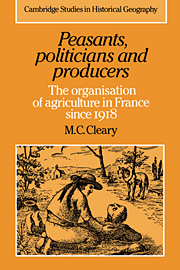Book contents
- Frontmatter
- Contents
- List of figures
- List of tables
- Preface
- Abbreviations
- Base map of the départements of France
- Introduction
- 1 The transformation of rural France
- 2 Individuals and associations in the farming community
- 3 Agricultural associations before 1914
- 4 The heyday of the regional unions, 1918–1930
- 5 The economic crisis and the rise of corporatism, 1930–1940
- 6 Agricultural associations under Vichy, 1940–1944
- 7 A rural revolution? Syndicates and cooperatives, 1944–1965
- 8 The deceptions of progress, 1965–1985
- 9 Representing the community – the place of salaried labour and women
- 10 Conclusion
- Notes
- Bibliography
- Index
3 - Agricultural associations before 1914
Published online by Cambridge University Press: 28 October 2009
- Frontmatter
- Contents
- List of figures
- List of tables
- Preface
- Abbreviations
- Base map of the départements of France
- Introduction
- 1 The transformation of rural France
- 2 Individuals and associations in the farming community
- 3 Agricultural associations before 1914
- 4 The heyday of the regional unions, 1918–1930
- 5 The economic crisis and the rise of corporatism, 1930–1940
- 6 Agricultural associations under Vichy, 1940–1944
- 7 A rural revolution? Syndicates and cooperatives, 1944–1965
- 8 The deceptions of progress, 1965–1985
- 9 Representing the community – the place of salaried labour and women
- 10 Conclusion
- Notes
- Bibliography
- Index
Summary
In late-nineteenth-century France, the representation and organisation of the peasant mass of the population lay largely in the hands of a small élite of landowners and nobility. In their local cormices agricoles and departmental societies of agriculture, they sought both an amelioration of the often restricted social life of the country gentry and an improvement in the quality of local farming. The agricultural fair, monthly exchanges of ideas and information, and the occasional attempt at agricultural experimentation constituted the sum total of most of their activity. The impact of such groups on the mass of the farming population is hard to judge – it was likely to have been minimal. Membership was small and the resources of such groups equally limited and, whilst some regions were better endowed with such groups than others, their role as catalysts for economic change remained restricted.
The origins of syndicalism
When the Waldeck–Rousseau legislation of March 1884 was passed, the response of the most important national farming body, the Sociétée des agriculteurs de France, was swift. Its committee members quickly endorsed the need to encourage the creation and expansion of a movement capable of focusing the diverse interests of the peasantry into locally based groups with a clear economic potential. The society itself was financially strong and, with its membership of influential landowners and notables such as the Marquis de la Vogue, de la Tour du Pin and Emile Duport, it had a strong regional base to support the national policies of the organisation.
- Type
- Chapter
- Information
- Peasants, Politicians and ProducersThe Organisation of Agriculture in France since 1918, pp. 33 - 47Publisher: Cambridge University PressPrint publication year: 1989

